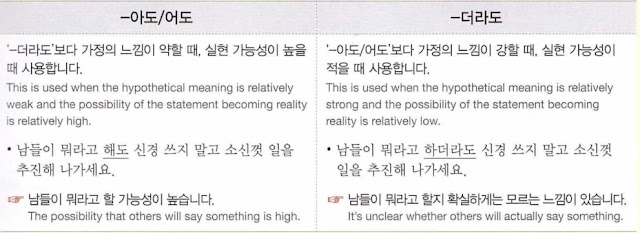-더라도 is used to indicate that while the speaker acknowledges and accepts the possibility of the content in the preceding clause, it does not have any effect on the content in the following clause. The preceding clause consists of a simple hypothetical statement or a statement acknowledging some present situation. This expression is commonly used together with 아무리.
가: 이번에 드디어 히말라야 에베레스트 등반을 성공하셨는데요. 그동안의 실패로 부담이 많이 되셨을 것 같은데 어떠셨습니까?
You finally succeeded in climbing Mount Everest in the Himalayas. It seemed that your previous failures had become quite a burden. So what was it like?
나: 이번에 또 실패하더라도 다음에 다시 도전하겠다는 각오로 갔기 때문에 그리 큰 부담은 없었습니다.
Even If I had failed this time as well, I had already made up my mind to try again the next time, so I didn’t feel that much of a burden.
가: 갑작스러운 눈사태로 아주 위험한 상황까지 갔었다고 들었는데요. 그럼에도 불구하고 계속 산에 오르시는 특별한 이유가 있나요?
I heard that you were in a very dangerous situation because of a sudden avalanche. Is there any particular reason you continued up the mountain despite those circumstances?
나: 산을 오르면서 많은 것을 배웠습니다. 거대한 자연 앞에서의 겸손함, 도전 정신, 특히 정상을 정복한 순간의 그 기분은 뭐라 말할 수가 없습니다. 그게 위험을 무릅쓰더라도 제가 산을 포기할 수 없는 이유지요.
I have learned a lot of things while climbing mountains. Being humbled at the sight of nature’s vastness, the spirit of challenge. And in particular, that feeling you get the instant you conquer the summit is just indescribable. That’s the reason I can’t quit climbing even while risking all the danger involved.

• 지금은 그 일을 끝내기가 어려워 보이더라도 끝까지 포기하지 말기를 바랍니다.
Even if that job seems difficult to finish, I want you to persevere to the end.
• 내가 손해를 보는 일이 있더라도 다른 사람에게 피해를 주는 일은 하고 싶지 않다.
Even if I sustain a loss, I don’t want to do anything to harm another person.
• 그 사람이 그 일에 대해서 부정적으로 평가를 내렸더라도 저는 그 일을 계속할 거예요.
Even if that person has evaluated that job negatively, I still want to continue doing it.
This expression can be replaced with -아도/어도, but the two expressions have the following differences.

>> You can click on the title of each grammar below to see other grammar which also expresses ‘Hypothetical Situations’
1. -더라도
2. -(으)ㄹ지라도
3. -(으)ㄴ들
4. -(으)ㄹ망정
5. -(느)ㄴ다고 치다
6. -는 셈치다
>> Full of ‘Korean grammar in use – Intermediate’: Click here

